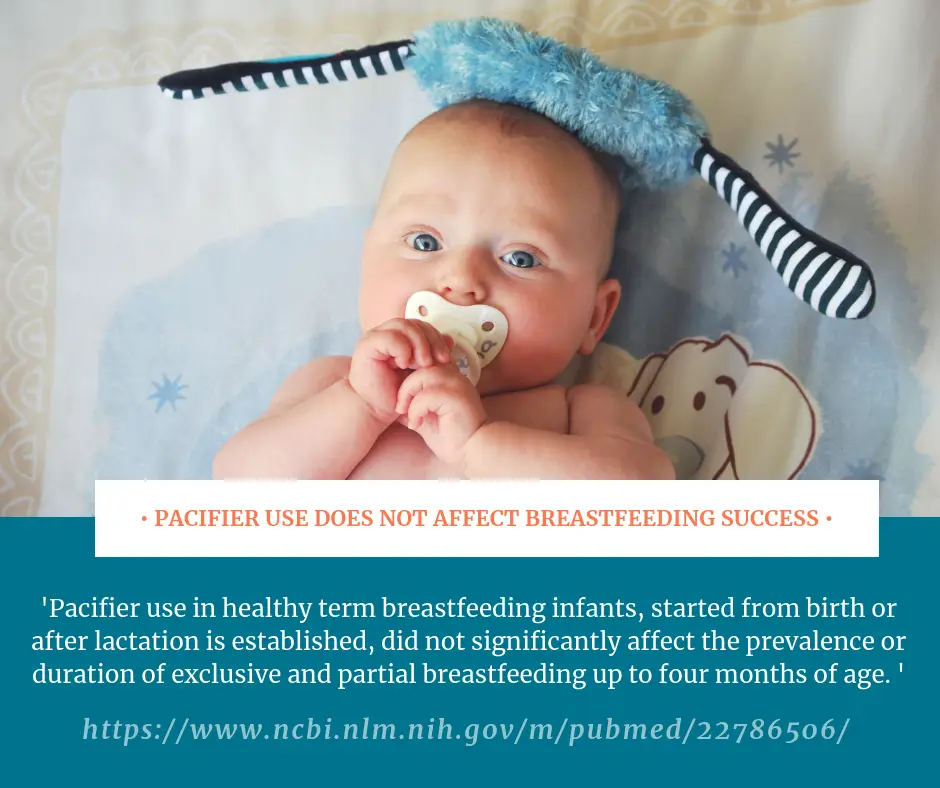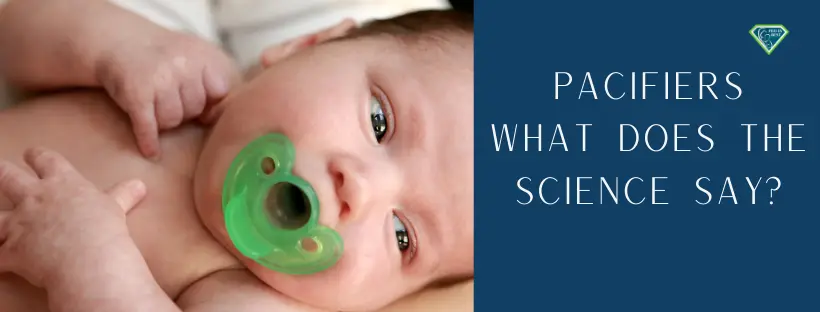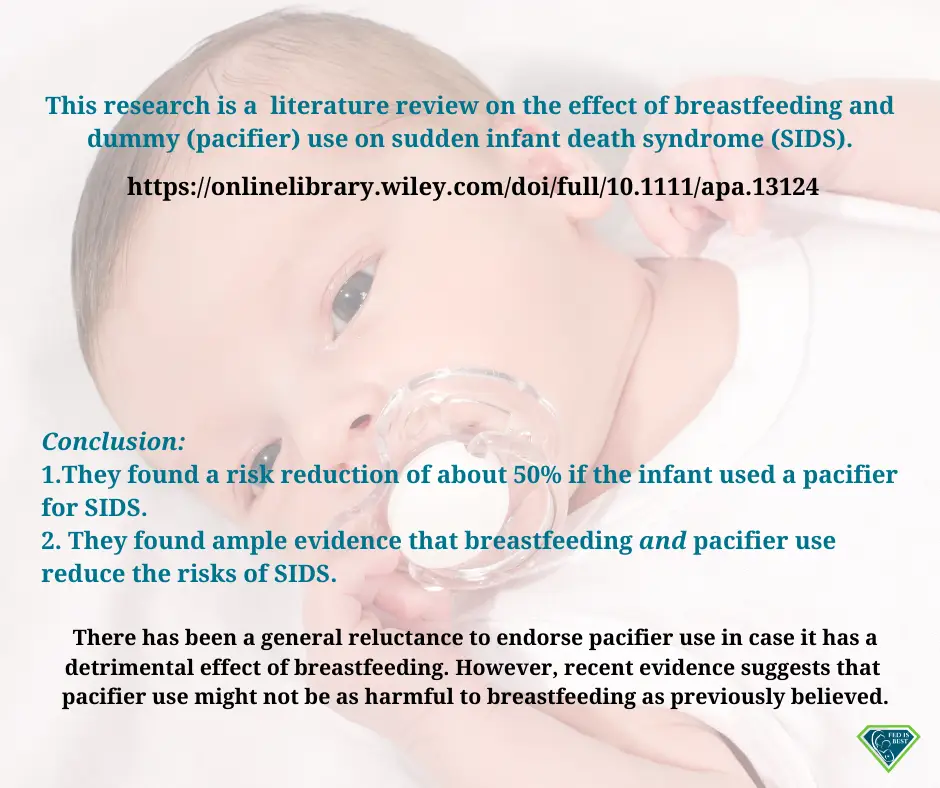“Can I have a pacifier?”
After helping a third-time mother latch her new baby, she requested the comfort tool she had used with her other two babies, whom she successfully breastfed until she went back to work and chose to wean. Our hospital policy is to educate patients on the many ways pacifiers can disrupt breastfeeding, rather than simply respecting the mother’s choice. The problems with this approach are twofold: there is recent good quality research showing pacifiers do not disrupt breastfeeding and actually reduce the risk of Sudden Infant Death Syndrome (SIDS). Even the WHO agrees—in 2018 they changed their Ten Steps to Successful Breastfeeding to reflect the fact that pacifiers are compatible with breastfeeding.
Breastfeeding and pacifier use have a protective effect on sudden infant death syndrome
In responding to my patient, I had to choose between scientific evidence and maternal autonomy on the one hand, and our hospital protocol on the other. I chose to sneak her a pacifier at her request. To do otherwise would have been disrespectful towards this experienced mother, denying her autonomy over her baby and her body, and would have been contrary to my Code of Professional Conduct as an IBCLC, which emphasizes evidence-based practice.

Cochran Review: Pacifier use versus no pacifier use in breastfeeding term infants for increasing duration of breastfeeding.
Unfortunately, I fully expect that my decision to provide a pacifier will be heavily criticized by some lactation professionals. While the thought of that is disappointing, I recognized my patient had the right to choose what was best for her, and current scientific research supported her decision too. In addition, as a woman of color, it’s likely that she had probably also experienced too many medical providers failing to listen to her and respect her wishes.
Even Partial Breast-Feeding Lowers SIDS Risk
New research confirms that breast-feeding for two to four months of a newborn’s life can significantly reduce the risk of sudden infant death syndrome (SIDS).But the study also found moms don’t need to breast-feed exclusively to reap that benefit. Even partial breast-feeding will do, the 20-region study found. “What is, perhaps, surprising is that there does not appear to be any benefit of exclusive breast-feeding over partial breast-feeding in relation to SIDS.
I hope that the tide will turn away from patronizing women with scripted responses minimizing their concerns and desires, and toward respecting our patients’ bodily and parental authority, and following current scientific evidence rather than outdated practices.

Example of scripted responses when asking for a pacifier.
— Lynnette Hafken, MA, IBCLC
For more information about pacifier use:
Cochrane Review: Pacifier use versus no pacifier use in breastfeeding term infants for increasing duration of breastfeeding. https://onlinelibrary.wiley.com/doi/full/10.1002/ebch.1853
WHO and UNICEF issue new guidance to promote breastfeeding in health facilities globally https://www.who.int/activities/promoting-baby-friendly-hospitals/ten-steps-to-successful-breastfeeding
Pacifiers and Exclusive Breastfeeding: Does Risk for Postpartum Depression Modify the Association? Conclusion: Pacifiers may help protect against the early cessation of EBF among mothers at high risk for depression. Additional research is needed to better understand this association. https://pubmed.ncbi.nlm.nih.gov/28841401/
Even Partial Breast-Feeding Lowers SIDS Risk
New research confirms that breast-feeding for two to four months of a newborn’s life can significantly reduce the risk of sudden infant death syndrome (SIDS).
But the study also found moms don’t need to breast-feed exclusively to reap that benefit. Even partial breast-feeding will do, the 20-region study found.
“What is, perhaps, surprising is that there does not appear to be any benefit of exclusive breast-feeding over partial breast-feeding in relation to SIDS,
https://www.webmd.com/parenting/baby/news/20171031/even-partial-breast-feeding-lowers-sids-risk#1
When Is the Use of Pacifiers Justifiable in the Baby-Friendly Hospital Initiative Context? A Clinician’s Guide
In such situations, the use of pacifiers can be considered therapeutic and even provide medical benefits to infants, including reducing the risk of sudden infant death syndrome. The argument opposing pacifier use, however, is based on potential risks such as nipple confusion and early cessation of breastfeeding. The Ten Steps to Successful Breastfeeding as embedded in the Baby-Friendly Hospital Initiative initially prohibited the use of pacifiers in a breastfeeding friendly environment to prevent potential associated risks. This article provides a summary of the evidence on the benefits of non-nutritive sucking, risks associated with pacifier use, an identification of the implications regarded as ‘justifiable’ in the clinical use of pacifiers and a comprehensive discussion to support the recommendations for safe pacifier use in healthy, full-term, and ill and preterm infants. The use of pacifiers is justifiable in certain situations and will support breastfeeding rather than interfere with it. Justifiable conditions have been identified as: low-birth weight and premature infants; infants at risk for hypoglycemia; infants in need of oral stimulation to develop, maintain and mature the sucking reflex in preterm infants; and the achievement of neurobehavioural organisation. Medical benefits associated with the use of pacifiers include providing comfort, contributing towards neurobehavioural organisation, and reducing the risk of sudden infant death syndrome. Guidelines are presented for assessing and guiding safe pacifier use, for specific design to ensure safety, and for cessation of use to ensure normal childhood development. https://onlinelibrary.wiley.com/doi/full/10.1002/ebch.1853
HOW YOU CAN SUPPORT FED IS BEST
There are many ways you can support the mission of the Fed is Best Foundation. Please consider contributing in the following ways:
- Join us in any of the Fed is Best volunteer and advocacy, groups. Click here to join our health care professionals group. We have: FIBF Advocacy Group, Research Group, Volunteer Group, Editing Group, Social Media Group, Legal Group, Marketing Group, Perinatal Mental Health Advocacy Group, Private Infant Feeding Support Group, Global Advocacy Group, and Fundraising Group. Please send an email to Jody@fedisbest.org if you are interested in joining any of our volunteer groups.
- If you need infant feeding support, we have a private support group– Join us here.
- If you or your baby were harmed from complications of insufficient breastfeeding please send a message to contact@fedisbest.org
- Make a donation to the Fed is Best Foundation. We are using funds from donations to cover the cost of our website, our social media ads, our printing and mailing costs to reach health providers and hospitals. We do not accept donations from breast- or formula-feeding companies and 100% of your donations go toward these operational costs. All the work of the Foundation is achieved via the pro bono and volunteer work of its supporters.
- Sign our petition! Help us reach our policymakers, and drive change at a global level. Help us stand up for the lives of millions of infants who deserve a fighting chance. Sign the Fed is Best Petition at Change.org today, and share it with others.
- Share the stories and the message of the Fed is Best Foundation through word-of-mouth, by posting on your social media page and by sending our FREE infant feeding educational resources to expectant moms that you know. Share the Fed is Best campaign letter with everyone you know.
- Write a letter to your health providers and hospitals about the Fed is Best Foundation. Write to them about feeding complications your child may have experienced.
- Print out our letter to obstetric providers and mail them to your local obstetricians, midwives, family practitioners who provide obstetric care and hospitals.
- Write your local elected officials about what is happening to newborn babies in hospitals and ask for the legal protection of newborn babies from underfeeding and of mother’s rights to honest informed consent on the risks of insufficient feeding of breastfed babies.
- Send us your stories. Share with us your successes, your struggles and everything in between. Every story saves another child from experiencing the same and teaches another mom how to safely feed her baby. Every voice contributes to change.
- Send us messages of support. We work every single day to make infant feeding safe and supportive of every mother and child. Your messages of support keep us all going.
- Shop at Amazon Smile and Amazon donates to Fed Is Best Foundation.
Or simply send us a message to find out how you can help make a difference with new ideas!
For any urgent messages or questions about infant feeding, please do not leave a message on this page as it will not get to us immediately. Instead, please email christie@fedisbest.org.
Thank you and we look forward to hearing from you!


